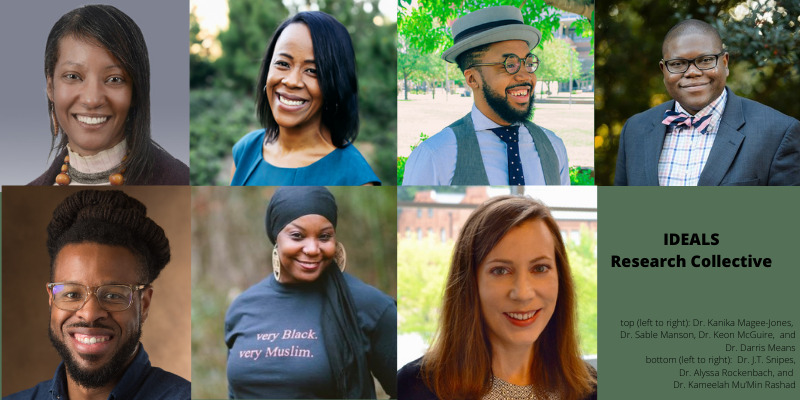A New Effort Studies Race and Religion to Improve Campus Life for Black Students
June 6, 2022

Did you know that only 45% of Black college seniors feel they have space and support to express themselves spiritually on campus?
Their perceptions of spiritual support are lower than those expressed by any other racial identity group, according to the Interfaith Diversity Experiences and Attitudes Longitudinal Survey (IDEALS). This finding and related insights was discussed in March 2022 at the Student Affairs Administrators in Higher Education (NASPA) Annual Conference. The session on March 21 (virtual) and 22 (in-person), “(Un)comfortable Being Here: How Campus Climate Impacts Belonging Among Black Students & What We Can Do About It,” delved into Black students’ experiences of religious diversity and promote the work coming out of a newly assembled group of educators known as the IDEALS Race & Religion Research Collective.
The Collective was assembled in 2021 to explore race and religion through lenses of research and practice; its members are diverse in their identities, experiences, areas of expertise within academia, institution types, and geographic contexts. Their mission is to critically examine, through a racial equity lens, the design and outcomes of the landmark IDEALS study conducted across the U.S. from 2015 to 2019. IDEALS originally grew out of a partnership between IFYC, Dr. Matthew Mayhew at The Ohio State University, and Dr. Alyssa Rockenbach at North Carolina State University to study students’ experiences of religious and worldview diversity in college. When the research concluded in 2020, IDEALS leaders—compelled by the racial reckoning of our nation in that moment—reflected on how to broaden both what was asked of IDEALS and who was defining and pursuing those questions. Out of that reflection, the Collective was born.
“The work of the Collective takes IDEALS in promising new directions, moving us beyond the original questions that framed the study to ever-evolving questions that engage critical frameworks and center racial justice in higher education,” Dr. Alyssa Rockenbach wrote in an email. Rockenbach continues, “Together we seek to disrupt systems of oppression (like anti-Black racism, white supremacy, Christian hegemony) in education and society; illuminate the intersections of race, religion, and spirituality in Black students’ narratives and educational journeys; and reimagine and advance educational environments, policies, and practices that are, humanizing, just, and transformative.”
When the group first convened in 2021, they were invited to consider new methodological approaches for exploring race and religion. A scholarly manuscript is now in the works that will challenge traditional methods for gathering data on race and religious identity. Dr. J.T. Snipes, assistant professor at Southern Illinois University – Edwardsville, co-leads the Collective alongside Rockenbach and had this to say about the manuscript:
“The article is being crafted to address the fundamental ways in which we capture data at the intersections of race and religion. Through our engagement with recent critical quantitative scholarship, we’ve recognized a gap in how we both understand and gather this type of data. Our hope is to help researchers and practitioners better capture the nuances related to race and religion. Collecting better data at this intersection helps us to better support and care for our students.”
Another explicit goal of the Collective is to build a community of stakeholders invested in matters of racial and religious diversity in higher education. According to Dr. Sable Manson at the University of Southern California, the group presenting at NASPA has been contemplating what “additional opportunities or ways to participate in community around these topics” might interest attendees at their session. Group members have also contemplated how to engage institutional researchers and campus decision makers in conversation about the benefits of conceptualizing racial and worldview identities in new and more expansive ways. Most importantly, members of the IDEALS Research Collective are themselves modeling what an engaged community can accomplish by using their current projects to ignite conversations and galvanize institutional change.
This article was originally posted on March 17, 2022.
Share
Related Articles
Higher Education
Higher Education
Racial Equity
Immigrant Faith Communities On Rooting Out Anti-Black Racism
“Together we seek to disrupt systems of oppression (like anti-Black racism, white supremacy, Christian hegemony) in education and society; illuminate the intersections of race, religion, and spirituality in Black students’ narratives and educational journeys; and reimagine and advance educational environments, policies, and practices that are, humanizing, just, and transformative.”




